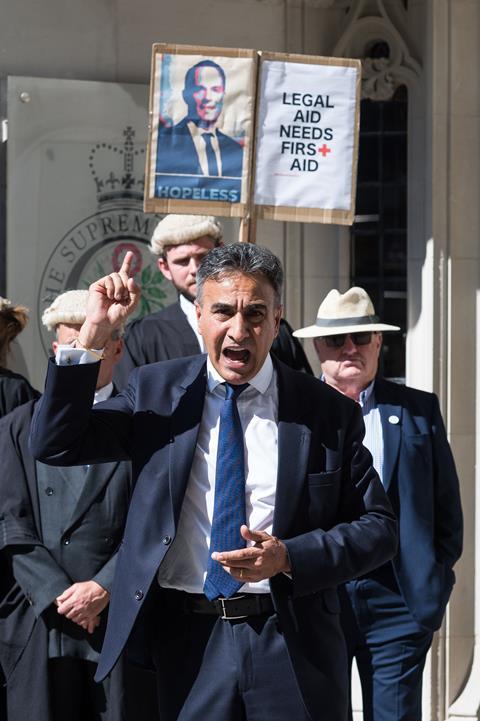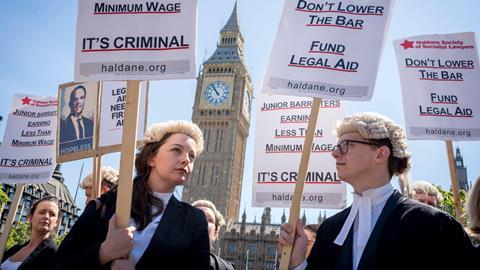Despite yesterday’s extreme heat, dozens of criminal legal aid barristers took their fight over legal aid funding to parliament.
‘It shows what sort of spirit we have at the criminal bar,’ Criminal Bar Association chief Jo Sidhu told the delegation of barristers, parliamentarians and MPs in committee room 4A of the House of Lords in the morning.
That spirit saw criminal legal aid lawyers put their lives at risk by working through the pandemic, refusing to shirk their responsibilities. Now, on one of the hottest days on record, ‘we bring ourselves into the heart of parliament, to let parliamentarians know we have to speak not just on our own behalf but for the voiceless in the criminal justice system’, he said.
For the benefit of parliamentarians and MPs in the room, Sidhu explained the full extent of the crisis. The situation was so dire that Sir Christopher Bellamy recommended a minimum 15% remuneration increase, with no scope for further delay. The government received his report last November. 'There has been no follow-through in the way that Sir Christopher Bellamy envisaged and urged.'
‘Do you care about the system? If you do, you will understand we cannot run without the men and women in this room,’ Sidhu said.
‘Do you care about the victims, the defendants now in custody forced to wait upwards of 700 days for cases to be heard in the Crown court? Do you care about victims of sexual violence forced to wait upwards of 1500 days before cases are completed? Do you care about women forced to walk away as victims from prosecutions because they were kept waiting three, four sometimes five years for justice?
‘Do you care about us? We have lost a quarter of our workforce over the last five years.’

‘Do you care about diversity? If you do, you will understand losing 40% of our juniors – the most diverse cohort among us – is not going to promote diversity, it will strangle diversity.’
Junior barristers were ‘slogging their guts out’ for £6.25 an hour. ‘A figure so below the minimum wage is a complete and utter embarrassment to any civilised society,’ Sidhu said.
Among those listening to Sidhu’s impassioned speech was Oliver Heald, Conservative MP for North East Hertfordshire and a former justice minister.
‘We welcome you here today,’ he said. ‘It is important MPs should hear what you are saying and understand the issue. For a lot of people, they hear the government talk of 15% without realising the sort of background Jo explained and the way remuneration works. The way you are explaining this now is something that is welcome to us all.’
Heald revealed he is a member of a Conservative backbench justice committee, which is meeting lord chancellor Dominic Raab today. ‘Everything you say today will have resonance. I will be able to take it up with him. You are right to concentrate on this issue. Jam tomorrow is not really cutting it. We need bread today.’
On backdating legal aid fees, Conservative MP Bob Neill, chair of the House of Commons justice select committee, told the meeting that ‘the argument put forward to us is that the system is so complicated in the Legal Aid Agency that unscrambling it to do retrospective changes to existing certificates will take a lot of work. I do not buy that.’
Neither did one of the barristers in the room, who described the government’s justification as ‘laughable’. She pointed out that the LAA has sufficient time and resources to argue with practitioners about, for instance, whether a 50p train ticket booking charge comes under the legal aid scheme.
Another barrister decided in February that she was not going to renew her practising certificate when it expired in April. ‘I was tired of spending my time apologising to defendants or victims that their trial cannot go ahead again. I was tired of having to sit up until 3am preparing those cases when I knew [I’d be told] those trials were going to be ineffective. I had a full tank when I started this job. I’m running on empty.’
In court in February, her case was adjourned for a date she could not do. ‘I said to the judge I cannot be here beyond 30 March.’ A new trial date was set for July. Her vulnerable client begged her to cover the trial. She rang her mum because she did not know what to do. Except she did. She took the case and renewed her practising certificate. ‘It was the right thing to do. We do right by our client, not for ourselves. Please do right by us.’
Lord Randall of Uxbridge (Alexander John Randall), a former deputy chief whip, offered some advice on how to lobby. ‘MPs react best when constituents contact them.’
Two hours later, that’s precisely what 150 wigged and robed barristers did. They headed to Central Lobby where they handed in a ‘green card’, requesting a personal interview with their MP, to House of Commons service delivery coordinators. On the green card, they had to provide their contact details and reason for the interview. The service delivery coordinators then handed the ‘green card’ to the doorkeepers, who then tried to contact the MP or the MP’s staff.
Staff could not give a time for how long barristers might have to wait. It could be hours, they said.
But then, we saw the ‘green card’ system in action. About 10 minutes later, the first MP came down: Chris Philp, Conservative MP for Croydon South (and a former justice minister), wading through the crowd searching for his constituent, green card in hand.
The phone rang. Another MP was unavailable but a member of their staff spoke to two barrister constituents over the phone, who explained the criminal justice crisis to them.
Mohammad Yasin, Labour MP for Bedford, walked into the lobby, green card in hand, looking for his constituent. He was present at the morning meeting. ‘I have got the CBA’s briefing. It’s shocking.’ Staff of another MP requested a copy of the CBA’s one-page briefing. I turned around and saw Janet Daby, Labour MP for Lewisham East, talking to three constituents. Tannoy calls went out for other MPs.
And so it went on.
I left parliament at around 4.30pm. Jo Sidhu and CBA secretary Lucie Wibberley were chatting to members who were still waiting in Central Lobby. A couple of barristers were talking to MPs' staff. I bumped into a few more barristers along the corridors of parliament and Westminster Hall. Hopefully, they were not waiting much longer.
When I got home, I turned on the TV. Boris Johnson was giving his farewell speech in the Commons chamber. Sitting just behind him? Raab.
I’m not sure if any constituent of Esher and Walton submitted a green card to see the justice secretary. ‘Great to see so many colleagues vote in support for Rishi today,’ he tweeted yesterday evening. Did he also see the 150 barristers who turned up at his workplace?
I leave you with the description that one constituent gave on their ‘green card’ for requesting an interview with their MP: ‘Saving the legal aid profession and justice.’
The fight continues.





































No comments yet